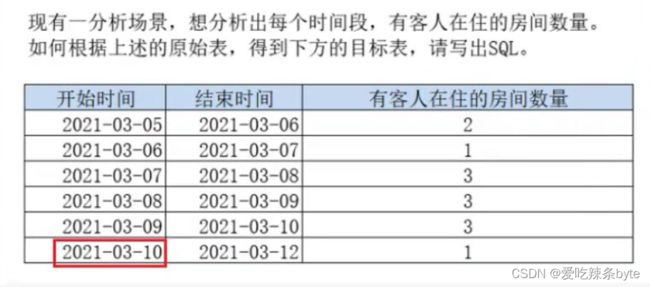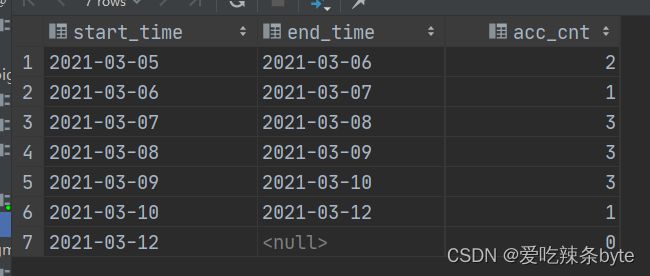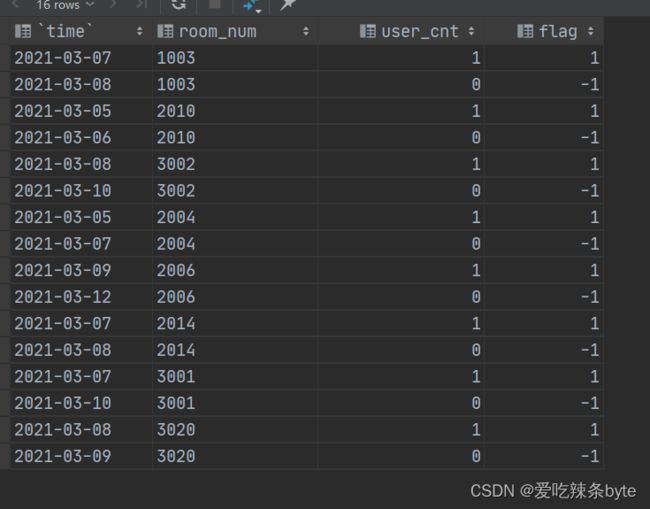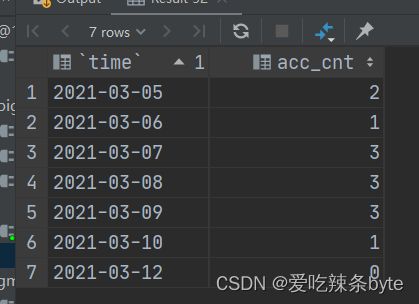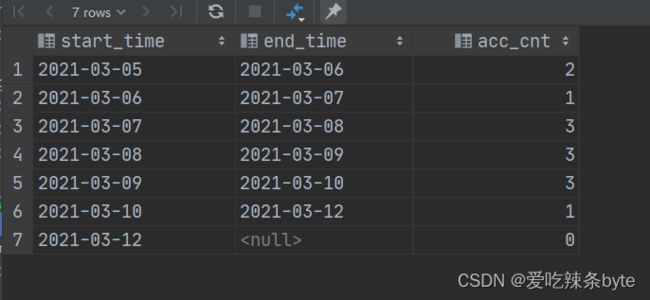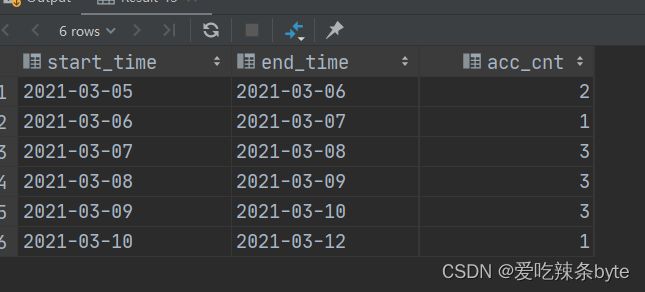HiveSQL——统计当前时间段的有客人在住的房间数量
注:参考文章:
HiveSQL一天一个小技巧:如何统计当前时间点状态情况【辅助变量+累计变换思路】_sql查询统计某状态出现的次数及累计时间-CSDN博客文章浏览阅读2k次,点赞6次,收藏8次。本文总结了一种当前时间点状态统计的思路和方法,对于此类问题主要采用构造辅助计数变量及累加变换思路进行求解。常见的场景有:直播同时在线人数、服务器实时并发数、公家车当前时间段人数、某个仓库的货物积压数量,某一段时间内的同时处于服务过程中的最大订单量等_sql查询统计某状态出现的次数及累计时间https://blog.csdn.net/godlovedaniel/article/details/129881211
0 需求描述
1 数据准备
create table if not exists table23
(
user_id int comment '用户id',
room_num string comment '房间号',
in_time string comment '入住时间',
out_time string comment '离店时间'
)
comment '旅客入住离店表';
insert overwrite table table23
values (7, '2004', '2021-03-05','2021-03-07'),
(23,'2010', '2021-03-05','2021-03-06'),
(7, '1003', '2021-03-07','2021-03-08'),
(8, '2014', '2021-03-07','2021-03-08'),
(14, '3001','2021-03-07','2021-03-10'),
(18, '3002','2021-03-08','2021-03-10'),
(23, '3020','2021-03-08','2021-03-09'),
(25, '2006','2021-03-09','2021-03-12');2 数据分析
需求:求出每个时间段,有客人在住的房间数量。
如果只考虑一人一房,可以借助于【直播间同时在线人数】统计的思路,相关sql逻辑指路:
HiveSQL题——聚合函数(sum/count/max/min/avg)-CSDN博客文章浏览阅读1.1k次,点赞19次,收藏19次。HiveSQL题——聚合函数(sum/count/max/min/avg)https://blog.csdn.net/SHWAITME/article/details/135918264?ops_request_misc=%257B%2522request%255Fid%2522%253A%2522170804307516800211583058%2522%252C%2522scm%2522%253A%252220140713.130102334.pc%255Fblog.%2522%257D&request_id=170804307516800211583058&biz_id=0&utm_medium=distribute.pc_search_result.none-task-blog-2~blog~first_rank_ecpm_v1~rank_v31_ecpm-1-135918264-null-null.nonecase&utm_term=%E7%9B%B4%E6%92%AD%E9%97%B4&spm=1018.2226.3001.4450 入住时间加辅助标记记为1,离店时间加辅助标记记为-1,并按照时间进行顺序排序,求当前累计值,具体SQL如下:
select
start_time,
end_time,
acc_cnt
from (select
`time` as start_time,
lead(`time`) over ( order by `time`) as end_time,
acc_cnt
from (select
`time`,
sum(flag) over (order by `time`) as acc_cnt
from (
select
in_time as `time`,
1 as flag
from table23
union all
select
out_time as `time`,
-1 as flag
from table23
) t1
) t2
group by `time`, acc_cnt
) t
where end_time is not null;上述代码需要考虑一个问题:如果有多个人共住一房间,今天退了一个人,明天又退了一个人,后天的时候才退完,虽然这期间一直有人在退,但房间还是有人住的,这种情况是不是也算【有客人在住的房间】? 如果考虑上述情况,需要对累加的状态进行调整,此时需要考虑每个房间中截止当前时间的人数情况。
第一步:先求出每个房间截至当前时间的人数累计值,作为状态判断辅助条件
select
`time`,
room_num,
sum( user_cnt) over (partition by room_num order by `time`) user_cnt
from (
select
in_time as `time`,
room_num,
count(user_id) user_cnt
from table23
group by in_time, room_num
union all
select
out_time as `time`,
room_num,
-1 * count(user_id) user_cnt
from table23
group by out_time, room_num
) t1第二步:基于累计的每个房间人数进行判断:如果房间有人就标记1,没有人时候就标记为-1。代码为:case when user_cnt > 0 时标记1,否则标记-1
select
`time`,
room_num,
user_cnt,
case when user_cnt > 0 then 1 else -1 end flag
from (select
`time`,
room_num,
sum(user_cnt) over (partition by room_num order by `time`) user_cnt
from (
select
in_time as `time`,
room_num,
count(user_id) user_cnt
from table23
group by in_time, room_num
union all
select
out_time as `time`,
room_num,
-1 * count(user_id) user_cnt
from table23
group by out_time, room_num
) t1
) t2;
第三步:基于第二步的结果,计算截止当前时间点的有人入住的房间数量 acc_cnt,SQL如下:
select
`time`,
room_num,
user_cnt,
case when user_cnt > 0 then 1 else -1 end flag,
sum(case when user_cnt > 0 then 1 else -1 end) over (order by `time`) acc_cnt
from (select
`time`,
room_num,
sum(user_cnt) over (partition by room_num order by `time`) user_cnt
from (
select
in_time as `time`,
room_num,
count(user_id) user_cnt
from table23
group by in_time, room_num
union all
select
out_time as `time`,
room_num,
-1 * count(user_id) user_cnt
from table23
group by out_time, room_num
) t1
) t2;
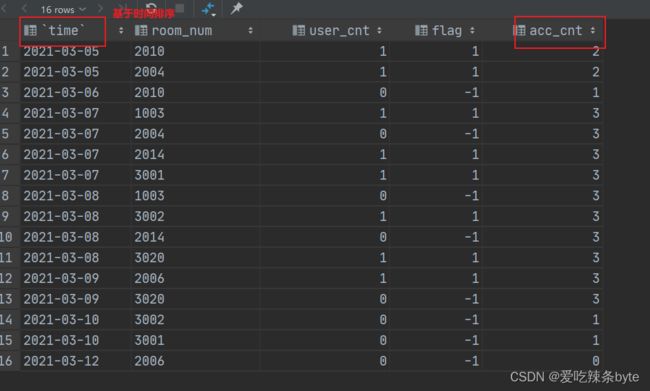 第四步:基于第三步的结果,对时间time 和截止当前时间点的有人入住的房间数量acc_cnt这两个字段进行去重,SQL如下:
第四步:基于第三步的结果,对时间time 和截止当前时间点的有人入住的房间数量acc_cnt这两个字段进行去重,SQL如下:
select
`time`,
acc_cnt
from (
select
`time`,
room_num,
user_cnt,
case when user_cnt > 0 then 1 else -1 end flag,
sum(case when user_cnt > 0 then 1 else -1 end) over (order by `time`) acc_cnt
from (select
`time`,
room_num,
sum(user_cnt) over (partition by room_num order by `time`) user_cnt
from (
select
in_time as `time`,
room_num,
count(user_id) user_cnt
from table23
group by in_time, room_num
union all
select
out_time as `time`,
room_num,
-1 * count(user_id) user_cnt
from table23
group by out_time, room_num
) t1
) t2
) t3
group by `time`, acc_cnt第五步:基于第四步的结果,通过lead函数(对time字段往后偏移一行)求出当前数据的结束时间end_time,SQL如下:
select
`time` as start_time,
lead(`time`, 1) over (order by `time`) as end_time,
acc_cnt
from (
select
`time`,
acc_cnt
from (
select
`time`,
room_num,
user_cnt,
case when user_cnt > 0 then 1 else -1 end flag,
sum(case when user_cnt > 0 then 1 else -1 end) over (order by `time`) acc_cnt
from (select
`time`,
room_num,
sum(user_cnt) over (partition by room_num order by `time`) user_cnt
from (
select
in_time as `time`,
room_num,
count(user_id) user_cnt
from table23
group by in_time, room_num
union all
select
out_time as `time`,
room_num,
-1 * count(user_id) user_cnt
from table23
group by out_time, room_num
) t1
) t2
) t3
group by `time`, acc_cnt
) t4:基于第五步的结果,过滤掉end_time 是null的数据,SQL如下:
select
start_time,
end_time,
acc_cnt
from (
select
`time` as start_time,
lead(`time`, 1) over (order by `time`) as end_time,
acc_cnt
from (
select
`time`,
acc_cnt
from (
select
`time`,
room_num,
user_cnt,
case when user_cnt > 0 then 1 else -1 end as flag,
sum(case when user_cnt > 0 then 1 else -1 end) over (order by `time`) acc_cnt
from (select
`time`,
room_num,
sum(user_cnt) over (partition by room_num order by `time`) user_cnt
from (
select
in_time as `time`,
room_num,
count(user_id) user_cnt
from table23
group by in_time, room_num
union all
select
out_time as `time`,
room_num,
-1 * count(user_id) user_cnt
from table23
group by out_time, room_num
) t1
) t2
) t3
group by `time`, acc_cnt
) t4
) t5
where end_time is not null;3 小结
针对【每个时间段的直播同时在线人数】 【每个时间段有客人在住的房间数量】这种类型的题目,本质是对(截至)当前时间点的状态统计。这种问题常见的解决思路是:对当前时间点的状态打标记flag,之后基于标记flag做开窗计算(结合窗口函数)或聚合计算。

